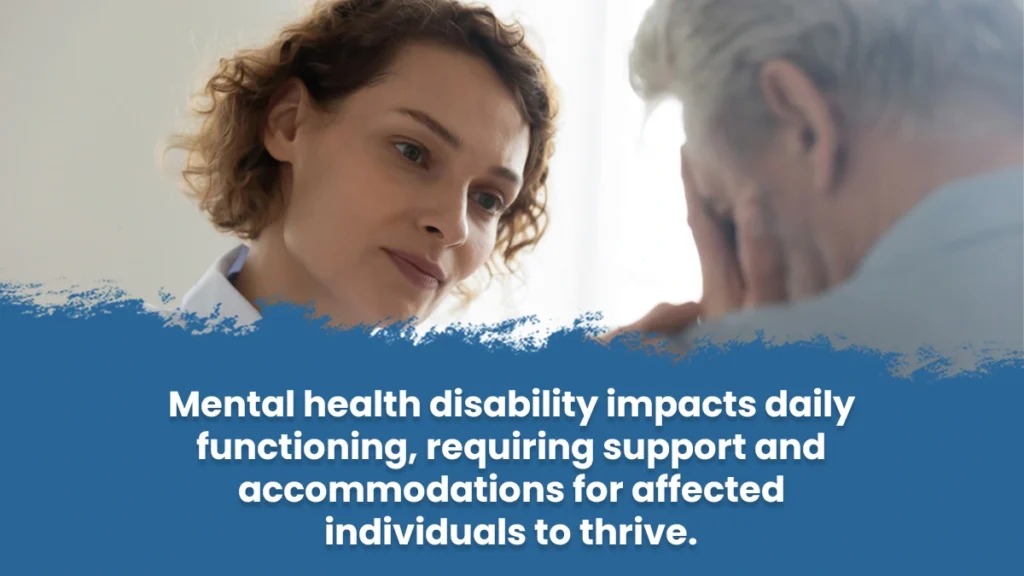Mental health disabilities impact millions of people globally. These conditions affect thinking, emotions, and behavior, causing restlessness in people. They can range from mild to severe, influencing daily life and overall well-being.
Understanding mental health disabilities is important. Continue reading to explore various types of mental health disabilities and their customized treatment strategies. Discover how individualized approaches can enhance quality of life.
Key Takeaways
Mental health disabilities require support and understanding to ensure well-being and inclusion. Here’s what you need to know:
- Different types of mental health disabilities encompass a wide range of conditions affecting mood and behavior.
- Numerous factors contribute to the emergence of mental health disabilities, impacting people in multifaceted ways.
- Effective treatment and management of mental health disabilities involve tailored interventions and holistic support systems.
The Haven Detox-New England offers various services to treat mental health disabilities. Call us at (844) 933-4145 to get details.
Defining Mental Health Disability
A mental health disability is a condition that affects thoughts, emotions, or behaviors, hindering daily functioning. These mental health conditions can make managing tasks, relationships, or goals challenging. Treatment and support are essential for managing symptoms and improving quality of life.
Recognizing mental health disabilities as legitimate health conditions, not weaknesses, is vital. Empathy and de-stigmatization are essential for promoting inclusivity and ensuring access to necessary resources. Creating supportive environments helps people with mental illnesses thrive.
Common Types Of Mental Health Disabilities
Various mental health conditions affect individuals differently, and understanding these disabilities is important in today’s society requiring awareness and support. Some common mental disorders are:
- Anxiety Disorder: Persistent worry, fear, or panic, often interfering with daily life and activities.
- Depression: Persistent sadness, loss of interest, affecting mood, behavior, and physical health.
- Bipolar Disorder: Extreme mood swings from manic highs to depressive lows, impacting emotions and behavior.
- Autism Spectrum Disorder: Difficulty in social interaction, communication, and repetitive behaviors or interests.
- Neurodevelopmental Disorders: Challenges in learning, communication, and behavior, often present from early childhood.
- Obsessive Compulsive Disorder: Intrusive thoughts leading to repetitive behaviors or rituals, disrupting daily functioning.
- Attention Deficit Hyperactivity Disorder: Difficulty focusing, impulsivity, and hyperactivity, affecting attention and behavior.
- Major Depressive Disorder: Persistent low mood, affecting energy levels, sleep, appetite, and concentration.
By accepting mental disabilities, we foster empathy and create a supportive environment for all. Together, we can break stigmas and promote inclusivity and understanding.
Causes And Risk Factors
Various factors contribute to mental health issues. Genetic influences, environmental factors, traumatic experiences, substance abuse, and chronic medical conditions are key contributors. Understanding these factors is essential for recovery.
Genetic Influences
Genetic factors predispose individuals to mental health issues. Inherited traits influence susceptibility. Specific genes may increase vulnerability to conditions like psychotic disorders. Genetic predisposition doesn’t guarantee illness but raises risk. Understanding genetic influences aids in early detection and intervention for mental health disorders, promoting better outcomes.
Environmental Factors
Environmental circumstances significantly impact mental health. Stressors such as poverty, abuse, or discrimination contribute to psychological disabilities. Access to resources and social support can mitigate risks. Healthy environments foster resilience and protect against mental health issues. Addressing environmental factors is crucial for promoting mental well-being.
Traumatic Experiences
Trauma significantly affects mental health. Events like abuse, accidents, or combat lead to psychological distress. Traumatic brain injury or spinal cord injury can result in higher risk. Processing trauma through therapy is essential for recovery. Early intervention reduces the long-term effects of traumatic experiences.
Substance Abuse
Substance use disorder exacerbates mental health issues. Direct effects of substances impact areas of mental functioning. Addiction compounds psychological and physical disabilities. Substance abuse often co-occurs with psychiatric disability, complicating treatment. Addressing substance abuse is vital for managing mental health conditions effectively.
Chronic Medical Conditions
Chronic diseases impact mental well-being. Conditions like diabetes or cardiovascular disease increase vulnerability. Chronic disease may lead to major depression or anxiety disorders. Addressing the psychological impact of chronic conditions improves overall quality of life. Integrated care ensures holistic management for better outcomes.

Assessment And Diagnosis
Understanding mental health disabilities involves recognizing symptoms, using diagnostic criteria, and seeking professional evaluations. These steps are crucial for accurate diagnosis and effective treatment. Self-assessment tools also help identify potential issues. By understanding these aspects, individuals can take informed steps toward managing their mental health.
Symptoms And Warning Signs
The first step is to recognize symptoms and warning signs. Look for changes in behavior, mood, or thinking. Common signs include withdrawal, extreme mood swings, and changes in eating or sleeping habits. Early detection can lead to better outcomes.
Diagnostic Criteria
Diagnostic criteria help professionals identify mental health conditions. They use established guidelines, like the DSM-5, which provides a structured approach and ensures that diagnoses are accurate and consistent.
Professional Evaluation
A professional evaluation involves a detailed assessment by a mental health expert. They conduct interviews and psychological tests and review medical history. This thorough process ensures an accurate diagnosis. It helps in creating an effective treatment plan.
Self-Assessment Tools
Self-assessment tools like online quizzes and questionnaires help individuals understand their mental health and identify potential issues. They are not a replacement for professional help but can guide individuals to seek further evaluation.
Mental Health Disability Benefits
When individuals face mental health challenges that significantly impact their ability to work, they may be eligible for disability benefits through the Social Security Administration (SSA). This program, Social Security Disability Insurance Benefits (SSDI) or Supplemental Security Income (SSI), offers financial support to those with intellectual disabilities.
The SSA evaluates mental health claims based on the severity of the condition and its impact on the individual’s ability to work. To qualify, applicants must meet specific eligibility requirements and provide medical evidence, such as medical records, to support their claim. Applicants may need to demonstrate that their intellectual disorder meets the criteria outlined by the SSA.
In addition, this process can involve providing detailed information about symptoms, treatments, and the functional limitations caused by the disorder. Applicants may seek assistance from a disability lawyer to navigate the application process and ensure they receive the SSI benefits they deserve. Once approved, recipients may receive monthly payments to help cover their financial obligations, such as medical bills and living expenses.
This mental health disability payment aims to provide essential support to individuals who are unable to work due to their mental health conditions. Furthermore, beneficiaries may also receive access to health insurance and community support programs to assist them in managing their condition and improving their quality of life. Ultimately, mental health disability benefits play a vital role in supporting individuals and contributing to the overall well-being of the national economy.
Management And Treatment
Navigating mental health disabilities requires a comprehensive approach. Medication, overseen by medical professionals, plays a crucial role in symptom management. Prioritizing holistic care empowers individuals towards improved well-being and resilience.
Support Groups
Support groups provide community and understanding, allowing individuals to share experiences and coping strategies. They benefit a diverse group of people, including adults facing frequent mental distress or children with behavioral challenges.
Mindfulness And Relaxation Techniques
Mindfulness and relaxation techniques, like meditation or deep breathing, help reduce stress and promote mental clarity. These methods can benefit individuals of all ages and provide tools for managing daily challenges.
Tailored Treatment Plans
Treatment plans are tailored to individuals’ needs, considering factors like age, severity of symptoms, and personal preferences. Family members may play a pivotal role in supporting loved ones through mental health treatment.
Integration Into Health Systems
Mental health services are integrated into health systems, ensuring accessibility for those in need. The goal is to empower people to lead fulfilling lives despite mental health challenges, fostering resilience and recovery.
Living With A Mental Health Disability
Living with a mental health disability can present various challenges. Examples of disorders include depression, anxiety disorders, etc. These conditions can result in significant deficits in daily functioning, making it challenging to perform job-related tasks. Employers and employees alike should be aware of these challenges and work together to provide reasonable accommodations in the work setting.
Family members can offer vital support to individuals with mental health impairments. Employers can implement work-related programs to support employees with mental health disabilities, such as flexible job hours or access to counseling services. Employers can help individuals engage in goal-directed activities and higher-level work tasks by fostering a supportive environment.
It’s essential to recognize that individuals with mental health disabilities can thrive in the workplace with the proper support. Employers can be noteworthy in creating a comprehensive environment where everyone feels valued and supported. By implementing programs tailored to the needs of employees, employers can promote productivity and well-being for all workforce members.
Verify Insurance
Let’s get you or a loved one help with a few simple steps.




